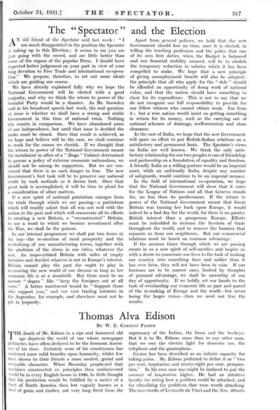The " Spectator
and the Election AN old friend of the .Spectator said last week : " I am much disappointed in the position the Spectator is taking up in this. Election ; it seems to me you are just going with the- crowd, and are little better than some of the organs of the popular Press. I should have expected better judgement on your part in view of your long devotion, to Free Trade and international co-opera- tion." We propose, therefore, to set out some ideals which are guiding our course.
We have already explained fully why we hope the National Government will be elected with a good majority, and why we think the return to power of the Socialist Party would be a disaster. As Mr. Snowden said in his broadcast speech last week, the real question at issue is whether we shall have a strong and stable Government . in this time of national crisis. Nothing else counts in comparison. We have abandoned some of our independence, but until that issue is decided the ranks must be closed. Once that result is achieved, as we hope and believe will be the case, we shall continue to work for the causes we cherish. If we thought that the return to power of the National Government meant the instalment in office of a " Jingo " Cabinet determined to pursue a policy of extreme economic nationalism, we should not be among its supporters. But we are con- vinced that there is no such danger to fear. The new Government's first task will be to preserve our national credit by such methods as it deems best. Once that great task is accomplished, it will be time to plead for a consideration of other matters.
If a new spirit of national patriotism emerges from the trials through which we are passing—a patriotism which will readily admit that all was not well with the nation in the past and which will consecrate all its efforts to creating a new Britain, a " reconstructed " Britain, to use a word to which we became accustomed after the War, we Shall be the gainers.
In our internal programme we shall put two items at the top—the re-creation of rural prosperity and the revitalizing of our manufacturing towns, together with the abolition of the slums in our cities, whatever the cost. An impoverished Britain with miles of empty factories and derelict wharves is not in Europe's interest. Britain cannot play the part she ought to play in re-creating the new world of our dreams so long as her economic life is at a standstill. But there must be no narrow " slogan " like " keep the foreigner out at all costs." A better watchword would be " Support those who support you," and our vast trading interests in the Argentine,• for example, and elsewhere must not be put in jeopardy. Apart from general policies, we hold that the new Government should lose no time, once it is elected, in telling the teaching profession and the police that one of its own first duties, when the Budget is balanced and our financial stability assured, will be to abolish the temporary reduction in salaries which it has been compelled to make. We hope that a new principle of giving unemployment benefit will also be adopted : the principle that all who apply for the " dole " should be afforded an opportunity of doing work of national value, and that the nation should have something to show for its expenditure. This is not to say that we do not recognize our full responsibility to provide for our fellow citizens who cannot obtain work. Far from it ; but a wise nation would insist on getting something in return for its money, such as the carrying out of national schemes of drainage, reafforestation and slum clearance.
In the case of India, we hope that the new Government will spare no effort to put British-Indian relations on a satisfactory and permanent basis. The Spectator's views on India are well known. We think the only satis- factory relationship for our two peoples is one of friendship and partnership on a foundation of equality and freedom. A friendly India as a willing partner would be an imperial asset, while an unfriendly India, despite any number of safeguards, would continue to be an imperial menace.
In the field of international co-operation, we hope that the National Government will show that it cares for the League of Nations and all that Geneva stands for, no less than its predecessors. If the return to power of the National Government meant that Great Britain was turning her back upon Europe, it would indeed be a bad day for the world, for there is no greater British interest than a prosperous Europe. Efforts must be redoubled to increase the freedom of trade throughout the world, and to remove the barriers that separate us from our neighbours. But our commercial relations must be based on common advantage.
If the anxious times through which we are passing create in us a new spirit of self-sacrifice and inspire us with a desire to consecrate our lives to the task of making our country into something finer and nobler than it has ever been, they will not have been in vain. If our horizons are to be narrow ones, limited by thoughts of personal advantage, we shall be unworthy of our day of opportunity. If we boldly set our hands to the task of overhauling our economic life as part and parcel of the re-making of Europe and the world—but never losing the larger vision—then we need not fear the results.














































 Previous page
Previous page